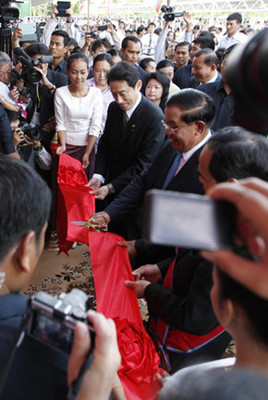(单词翻译:单击)
中英文本
Japanese investment in South-East Asia
东南亚地区的东瀛资本
Outward bound
向外拓展
A weak domestic economy is spurring Japanese firms to expand abroad
羸弱的国内经济形势鞭策着日本公司向海外进军
IT IS not every day that the opening of a shopping centre attracts a prime minister, but then Aeon Mall in Phnom Penh is not any old shopping centre. The Japanese-built complex is Cambodia's biggest, complete with an ice rink, television studio and bowling alley. For Hun Sen, the attending prime minister, it is a symbol of Japanese investment. Governments across South-East Asia are courting Japanese firms, and a torrent of yen is surging their way.
一间购物商场的开张剪彩吸引了国家首相的参与,这可不是天天都能看到的事情。不过,位于金边市的永旺购物中心也不是一般的旧式商城。这间由日本人建造的综合体是柬埔寨国内规模最大的商城,其中还配备了溜冰场、电视演播室和保龄球场。对于这位参加了剪彩活动的首相洪森来说,永旺购物中心正是日本投资的象征。目前,东南亚各国政府都在极力讨好日本公司,而与此同时,后者也用大量的日元为自身铺出了一条康庄大道。

Japanese investment in the region doubled to 2.3 trillion yen (24 billion) last year, the latest in a series of sizeable increases. Part of that is mergers and acquisitions by Japanese firms, which have skimped on investment at home and so have a cash hoard of some 229 trillion. SoftBank, a Japanese mobile carrier, just led a 100m investment in Tokopedia, an Indonesian e-commerce firm; Toshiba, a conglomerate, has pledged to invest 1 billion in South-East Asia over five years. A year ago Mitsubishi UFJ Financial Group, Japan's biggest bank, spent 536 billion to buy 72% of Thailand's Bank of Ayudhya.
日本人在东南亚地区的投资额连续大幅上涨,最新数据显示,去年该指标翻了一番,达到了2万3000亿日元(约240亿美元)。其中部分数额是由日本公司所主导的企业吸收与合并产生的。这些公司省下了在日本国内的投资款项,从而囤积了约有229万亿日元的现金储备。在日本移动通讯产业巨头软银(SoftBank)的领投下,印尼电商平台Tokopedia刚获得了1亿美元的融资;在过去的五年时间里,东芝集团(Toshiba)已经在东南亚许下了10亿美元的投资承诺。而在一年前,三菱UFJ金融集团(Mitsubishi UFJ Financial Group,日本规模最大的银行)出资5360亿日元,购买了泰国大城银行(Bank of Ayudhya)72%的股权。
During the first wave of Japanese investment, in the 1980s and 1990s, money poured into Thailand, Malaysia and Singapore, building up their automotive and electronics sectors. That flow largely ceased after the Asian financial crisis of 1997-98, when Japanese firms began to focus on China's vast, cheap labour force.
在第一次日本投资潮期间,即20世纪的80年代和90年代,资本涌入泰国、马来西亚和新加坡,构建了当地的汽车和电子产业。而大部分资金流在97至98年的亚洲金融危机后便随之终止。从那时开始,日本公司便将发展焦点转移到了中土王国,后者所拥有的劳动力不仅规模庞大,其价格也十分低廉。
Yet with labour costs now steadily rising in China, and political tensions between Japan and China continuing to flare, South-East Asia looks attractive again. Japanese investment in China fell by nearly two-fifths last year, even as it grew in places like Cambodia. Although China is still Japan's biggest trading partner, Japanese firms invested nearly three times more in South-East Asia last year. For South-East Asian countries, too, Japan is an important hedge against China.
然而,随着现在中土王国劳动力成本节节攀升,同时中日两国之间政治局势也在持续紧张,东南亚地区便再次成了令人垂涎三尺的宝地。即便是在柬埔寨之类的地区,去年的日本投资额也呈现出增长,但日方在华投资总额却下降了约五分之二。虽然中土王国目前还是日本最大的贸易伙伴,但去年日本企业在东南亚地区的投资总额比在中土王国的数额高出了接近三倍。对于东南亚各国来说,与日本方面合作同样也是一个抗衡中土王国的重要手段。
But the embrace of South-East Asia is not without its critics. Some worry that the headlong rush to the region by Japanese banks, in particular, may prove short-lived. In 2013 the Bank of Japan began buying bonds with newly created money (quantitative easing), as part of a plan by Shinzo Abe, the prime minister, to banish deflation and boost growth. The central bank's purchases left Japanese banks with lots of cash: they keep roughly 15% of their assets as excess reserves at the BoJ, earning minuscule returns. Since demand for loans in Japan is still subdued, they are hunting for borrowers abroad. Lending by Japanese banks to the rest of Asia, including China, has grown quickly since the end of 2012 and stood at 465 billion in June. But if Japan's monetary policy changes, such flows could reverse.
但是,一头扎进东南亚地区的策略也惹来了批评声音。部分人士担心,日本银行不顾一切地涌入该地区的行为,尤其是对于银行业来说,或许只是昙花一现。2013年,日本央行开始用新印的钞票购买债券(量化宽松),而这正是日本首相安倍晋三(Shinzo Abe)消除通缩和刺激经济增长计划当中的一部分。央行的债券购入使得日本各大银行拥有大量现钞:他们只预留了15%左右的资产作为央行所需要的超额准备金,而这是只能获得极低回报的那部分。由于日本的贷款需求依旧疲弱,银行们便把目光投向了海外市场。包括中土王国在内,日本银行对日本以外亚洲国家的放贷量迅速增长。本次增长自2012年底开始,到了本年6月贷款总额已经达到了4650亿美元。但如果日本的货币政策变更,情况也会随之逆转。
Meanwhile, Japan's government wants local firms to invest more at home. Quantitative easing has weakened the yen, making it more attractive to do so. But Japan's rapidly ageing population means the domestic market is shrinking, undermining the incentive to build new factories. For every Canon, a camera-maker, which recently said it would increase the share of its production in Japan, there are several counter-examples, such as Mitsubishi Motors, a carmaker, which is building a new factory in Indonesia. Japanese firms focus more on profits than in the past, thanks to improvements in corporate governance, notes Robert Feldman of Morgan Stanley, an investment bank; that is prompting them to look for better prospects abroad.
与此同时,日本政府希望本地公司更多地在日本本土进行投资。量化宽松政策已经使得日元贬值,投资活动也显得愈发吸引人。但日本方面急速加剧的人口老龄化问题,意味着国内市场的持续缩减,阻碍着新工厂的投资建设。近期,对于每一家声明想要增加“国内制造”份额的厂商来说,例如佳能(Canon,相机制造商),都有着好几家“反例”在与之共存。比方说,三菱汽车(Mitsubishi Motors,汽车制造商)就在印度设立了新的工厂。投行摩根士丹利(Morgan Stanley)的Robert Feldman表示,现在的日本公司比从前更注重于利润,而这都要归功于公司治理的进步;正是出于对利润的追求,鼓动着日本公司到海外寻找商机。
With more production shifting abroad, Japan's exports are also suffering. Deutsche Bank estimates that outbound investment reduced Japan's trade balance by as much as 16 trillion yen in 2012, by providing local substitutes for Japanese exports. That is more than Japan's trade deficit that year of 7 trillion yen. Profits from abroad were not sufficient to make up for the damage to the current account. As overseas ventures accelerate, they will help tilt Japan towards a trade deficit more often, leaving its financial system more vulnerable to the fragilities built up over decades.
海外生产增加的同时,日本的贸易出口也遭到了沉重打击。根据德意志银行(Deutsche Bank)的估计,由于其他国家本土生产的产品,可以替代日本的出口产品,2012年日本的海外投资对本国贸易逆差的增加额为16万亿日元,而这比当年7万亿日元的贸易逆差数额还要高。海外的利润并不足以补偿国内经常账户的损失。随着海外投资的加速增长,日本会因而更容易地处于贸易逆差的态势,使得本国金融系统在数十年来累计的脆弱性之下无所遁形。
The risk is that Japan could become a “rentier” economy, says Martin Schulz of the Fujitsu Research Institute in Tokyo. In this scenario, Japanese firms do not make the investments in Japan that are needed to generate broad-based wage growth, and focus instead on their foreign ventures. That would leave Japan living off the “rent” from its foreign assets, rather than the fruits of domestic economic activity.
东京富士通研究所(the Fujitsu Research Institute)的Martin Schulz表示,海外投资的风险,在于日本很可能由此变成了一个“食利者”经济体。在上述情况下,日本公司不再向国内的项目进行投资,但国内投资是提高国内工资水平的必要因素;日本公司会专注于旗下的外国企业。这会使得日本经济靠国外资产的“利息”来存活,不再是由国内经济活动收益来支撑。
That prospect does not seem to be deterring Japanese firms. Just outside Phnom Penh is a new industrial park set up to lure Japanese manufacturers such as Minibea, which makes tiny motors for mobile phones, and Ajinomoto, which makes food seasonings. There is a constant stream of new tenants; the zone is now in its third phase of development, says Hiroshi Uematsu, who oversees it. “As a private firm, you need to go somewhere,” he says.
这样的前景并没有阻止日本公司前进的脚步。就在金边市外围,有一片新建的工业园区,以吸引日本制造商的投资。例如,美蓓亚公司(Minibea,为手机提供微型马达的厂商)以及味之素公司(Ajinomoto,调味料厂商)都在该园区设立了厂房。园区项目的监管者Hiroshi Uematsu表示,现在不断地有新成员加入进来,而园区的第三期建设也在进程当中。他提到:“只要是一家私人企业,就需要走出国门去开拓新的领地。” 译者:颜士竣
译文属译生译世
词语解释
1.prime minister 首相,总理
Did you listen in to the Prime Minister yesterday evening?
你昨晚收听首相的广播讲话了吗?
He met with the Prime Minister of Japan for an hour and a half.
他和日本首相会晤了一个半小时。
2.pledge to 保证
He would keep his pledge to the utmost of his power.
他将极力信守他的誓言。
In the Second Training we pledge to practice generosity and not support social injustice and oppression.
在第二项训练中,我们保证,实践宽宏大量,不支持社会不公正和压迫。
3.build up 增进,加强
My neighbourhood has really been built up.
我的周围一带确实盖满了房子。
The area has been built up since I moved.
自我搬家以来这个地区就不断地盖起了新房。


